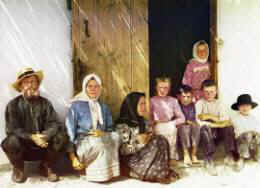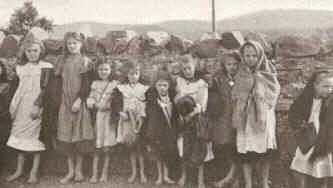National Identity in Russia from 1961 : Traditions & Deterritorialisation
GOING TO THE PEOPLE
MYTH, MEMORY & IDENTITY in RUSSIA & IRELAND
1-2 October 2010
Dugort, Achill Island, Ireland


Sergei Prokudin-Gorsky (c. 1909, http://www.loc.gov/exhibits/empire/)
Lynn
Doyle (c. 1935, http://www.irishhistorylinks.net/pages/Old_Photos.html)
Workshop on Russian/Irish culture
funded by:
Arts and Humanities Research Council (UK)
Achill
Heinrich
Böll Foundation
Participation as a speaker is by invitation only,
but
all are welcome to attend the sessions as observers.
Rationale
The aim of the workshop is to bring together Irish and Russian academics working in the fields of history, anthropology-ethnography, and folklore studies in order to discuss areas where Russian and Irish history and culture overlap, or where there is at least the possibility of fruitful comparative discussion.
Obviously, there
is much that is quite different about the two countries (a large multi-national
empire with an enormous military-industrial base and a commitment, under Soviet
rule, to communism and state atheism, versus rather a small and relatively
homogeneous country with little industrialisation and urbanisation till the late
twentieth century, and a strongly religious culture till then as well). However,
there are also striking resemblances, e.g.: the centrality of political
revolution to the identity of the two places; the reinvention of state symbolism
after embarking on post-revolutionary existence; the use of a sentimentalised
vision of rural culture to underpin the commonest forms of national-populism,
accompanied by programmes to collect ‘traditional’ forms of folklore (i.e.,
rural not urban, ‘pure’) that focused on selected areas (the far North in
Russia, the West in Ireland). Both Russia and Ireland also have a history of
large scale migrancy from rural to urban areas, and from rural areas to other
rural areas, encouraged or coerced by state sponsored programmes (e.g. Land
Commission reforms in Ireland, the Stolypin reforms and settlement schemes of
the Stalin years, and the resettling of inhabitants of so-called ‘futureless
villages’ under Khrushchev). In addition, both ‘traditions’ and migrancy
have played a crucial role in literature and the arts, and in grassroots visions
of national identity.
Given that there are few – if any – scholars actually working on comparative Irish/Russian topics, we are not expecting to start off with a strong sense of how Irish and Russian history may be compared, or that everyone would write papers that introduce an Irish dimension to Russian history (or conversely, a Russian dimension to Irish history). Rather, points of similarity and difference will emerge, we hope, in and from our discussions. We have requested that all participants should send an article, chapter, or outline in electronic form that we can circulate as an introduction to their work and the way that this fits into the general themes discussed.
Themes
Imagining
the Nation
The
focus here might be on the role of the national past and its impact on political
and intellectual culture. The role of populism (from nineteenth-century radical
traditions to the neo-populism of Stalin or De Valera) in shaping attitudes to
the nation is a feature that is clearly relevant to both cases. In both
countries, state institutions such as archives and museums have played a crucial
role. There are analogies in terms of practices too – e.g. major programmes of
commemorative public sculpture (and conversely, a sturdy heritage of
iconoclasm). But we will also be concerned with national identity as expressed
in customs and practices on the ground.
Going
to the People
The
idea here is not just to look at the nineteenth-century expeditions into the
social unknown that are usually understood by this term, but at the issue of
projects of social transformation more generally. In both Russia and Ireland,
idealisation of ‘the people’ has gone with a strong commitment to state
intervention. ‘Traditional culture’ was celebrated even as economic policies
and educational programmes totally reshaped the world that country-dwellers
lived in. Relevant to this session would also be the topic of ‘national
spaces versus local places’ – the generic celebration of ‘the
West’ or ‘the North’ on the one hand, as compared with lived experience of
a particular settlement or small town; the role of country estates, or more
recently, ‘second homes’ (from cottages to dachas) as focuses of alternative
experience in the rural hinterland.
Changing
Selves
If the previous two sessions were primarily concerned with collective identities, this session is focused more on individual identities. It will look at the cultural shifts and dislocations brought about political upheaval and ‘cultural crisis’, but also by migrancy and increasing awareness of a wider world. The extent to which terms such as ‘globalisation’ or ‘glocalisation’ actually do justice to the specific processes involved will form part of the discussion.
Plenary Lectures
Alongside workshop discussions around the above core topics, there will also be two formal lectures - by Roy Foster (University of Oxford) & by Nikolai Vakhtin (European University, St Petersburg) - to be held on the evening of Friday 1 October.
We
will also organise an ‘electronic exhibition’ of photographs of Ireland and
Russia that will run as background to the sessions.
Speakers
![]() Albert
Baiburin (European University, St Petersburg)
Albert
Baiburin (European University, St Petersburg)
![]() Rowenna
Baldwin (University of Warwick)
Rowenna
Baldwin (University of Warwick)
![]() Dmitry
Baranov (Russian Museum of Ethnography, St Petersburg)
Dmitry
Baranov (Russian Museum of Ethnography, St Petersburg)
![]() Guy
Beiner (Ben Gurion University of the Negev, Israel)
Guy
Beiner (Ben Gurion University of the Negev, Israel)
![]() Marc
Caball (University College, Dublin)
Marc
Caball (University College, Dublin)
![]() Catriona
Crowe (National Archive, Dublin)
Catriona
Crowe (National Archive, Dublin)
![]() Victoria
Donovan (University of Oxford)
Victoria
Donovan (University of Oxford)
![]() Terence
Dooley (National University of Ireland, Maynooth)
Terence
Dooley (National University of Ireland, Maynooth)
![]() Patty
Gray (National University of Ireland, Maynooth)
Patty
Gray (National University of Ireland, Maynooth)
![]() Catriona
Kelly (University of Oxford)
Catriona
Kelly (University of Oxford)
![]() Matt
Kelly (Southampton University)
Matt
Kelly (Southampton University)
![]() Jeanne
Kormina (Higher School of Economics, St Petersburg)
Jeanne
Kormina (Higher School of Economics, St Petersburg)
![]() Christian
Noak (National University of Ireland, Maynooth)
Christian
Noak (National University of Ireland, Maynooth)
![]() Niall
O'Ciosain (National University of Ireland, Galway)
Niall
O'Ciosain (National University of Ireland, Galway)
![]() Elena
Omelchenko (Region Centre, Ulyanovsk)
Elena
Omelchenko (Region Centre, Ulyanovsk)
![]() Sergei
Shtyrkov (European University, St Petersburg)
Sergei
Shtyrkov (European University, St Petersburg)
![]() Josie
von Zitzewitz (University of Oxford)
Josie
von Zitzewitz (University of Oxford)
Enquiries: josephine.vonzitzewitz@new.ox.uk